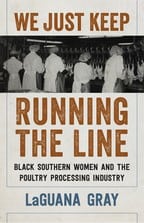At a time when agricultural jobs were in decline and Louisiana stood at the forefront of rising anti-welfare sentiment, much of the work available in the area went to men, driving women into less attractive, labor-intensive jobs. LaGuana Gray argues that the justification for placing African American women in the lowest-paying and most dangerous of these jobs, like poultry processing, derives from longstanding mischaracterizations of black women by those in power. In evaluating the perception of black women as “less” than white women—less feminine, less moral, less deserving of social assistance, and less invested in their families’ and communities’ well-being—Gray illuminates the often-exploitative nature of southern labor, the growth of the agribusiness model of food production, and the role of women of color in such food industries.
